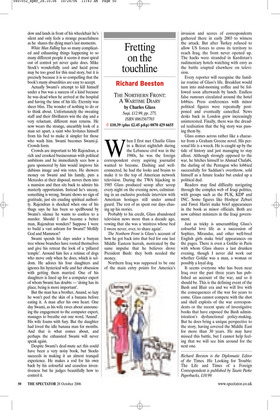Going under and coming up
Digby Durrant
WHITE MAN FALLING by Mike Stocks Alma Books, £12.99, pp. 285, ISBN 1846880092 ✆ £10.39 (plus £2.45 p&p) 0870 429 6655 It’s understandable that a man fails to kill himself with a puncture repair outfit or drown himself in a bucket but rather miraculous if he can’t throw himself under a bus successfully. Yet this is the melancholy achievement of ex-SubInspector Swaminathan, Swami, from Mullaipuram in the state of Tamil Nadu in southern India. A good man unjustly struck down by fate after cracking the rib of a Very Guilty Suspect during a routine inquiry, he suffers a cerebral haemorrhage leaving him barely able to walk or speak. Even when a white man throws himself out of a hotel win dow and lands in front of his wheelchair he’s silent and only feels a strange peacefulness as he shares the dying man’s last moments.
White Man Falling has so many complicated and exhausting things happening to so many different people it seems it must spiral out of control yet never quite does. Mike Stock’s wonderfully cool and lucid prose may be too good for this mad story, but it is precisely because it is so compelling that the book’s many absurdities are easy to accept.
Actually Swami’s attempt to kill himself under a bus was a success of a kind because he was dead when he arrived at the hospital and having the time of his life. Eternity was sheer bliss. The wonder of nothing to do or to think about. Unfortunately the sweating staff and their fibrillators win the day and a very reluctant, different man returns. He now wears the strange, unearthly look of a man set apart, a saint who levitates himself from his bed to make it simpler for those who wash him. Swami becomes Swami-ji. Crowds form.
Crowds are important to Mr Rajendran, a rich and crooked businessman with political ambitions and he immediately sees how a guru sponsored by him would improve his dubious image and win votes. He showers money on Swami and his family, puts a Mercedes at their disposal, moves them into a mansion and then sits back to admire his masterly opportunism. Instead he’s uneasy, something is wrong. Swami shows no sign of gratitude, just sits exuding spiritual authority. Rajendran is shocked when one of his thugs says he has been so spellbound by Swami’s silence he wants to confess to a murder. Should I also become a better man, Rajendran wonders? Suppose I were to build a vast ashram for Swami? Mollify God and Mammon?
Swami spends his days under a banyan tree whose branches have rooted themselves and give his retreat the look of a ‘pillared temple’. Around him lies a retinue of dogs who move only when he does, which is seldom. He adores his four daughters and ignores his hysterical wife and her obsession with getting them married. One of his daughters is lined up for a computer expert of whom Swami has doubts — ‘doing has its place, being is more important’.
But the man has a brother, Anand, so lazy he won’t peel the skin of a banana before eating it. A man after his own heart. One day Swami, as his wife raves about announcing the engagement to the computer expert, manages to breathe out one word, ‘Anand’. His wife foams with fury. But the daughter had loved the idle banana man for months. And that is what comes about, and perhaps the exhausted Swami will never speak again.
Despite Swami’s deaf-mute act this could have been a very noisy book, but Stocks succeeds in making it an almost tranquil experience. He makes a rod for his own back by his colourful and ceaseless inventiveness but he judges beautifully how to control it.



























































































 Previous page
Previous page